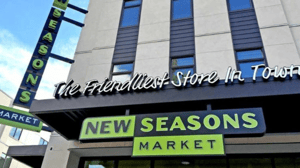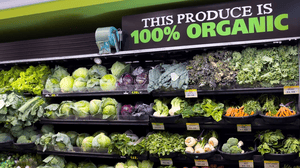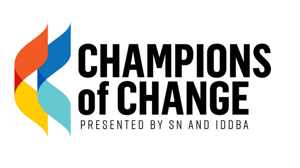Kroger Not for Sale, Dillon Tells Workers
CINCINNATI Kroger Co. here has ruled out the possibility that it is for sale after reports said it could be a target for a leveraged buyout by private equity. The idea of a buyout was raised in an April 6 story in the Wall Street Journal, which cited unnamed sources as saying Kroger was being examined by private investment firms as a possible takeover candidate. David B. Dillon, chairman and chief
April 16, 2007
ELLIOT ZWIEBACH
CINCINNATI — Kroger Co. here has ruled out the possibility that it is for sale after reports said it could be a target for a leveraged buyout by private equity.
The idea of a buyout was raised in an April 6 story in the Wall Street Journal, which cited unnamed sources as saying Kroger was being examined by private investment firms as a possible takeover candidate.
David B. Dillon, chairman and chief executive officer, said in a strongly worded memo to employees that it isn't going to happen, and most industry sources contacted by SN last week said they believe him. An acquisition of the $67 billion company would be the largest in the food retail industry's history and one of the largest LBOs of any kind ever executed.
“From what the company said, it does not appear to be welcoming an acquisition, nor is an acquisition the best way for the company to go,” Andrew Wolf, an analyst with BB&T Capital Markets, Richmond, Va., said. “It's taken Kroger five years to reestablish its competitive positioning in terms of pricing and merchandising against Wal-Mart and conventional players, and therefore it's no longer a feasible strategy to saddle the company with high debt levels.
“That was OK 20 years ago, when the industry was less competitive and when cash flows were more predictable — a period when you could get away with raising prices to help you pay down debt, which is what the industry did for about 10 years, through the mid-1990s.
“Recently Kroger has gone with a different strategy — to maintain and grow market share — and it's working. I believe an LBO would compromise that approach and would not be feasible in the competitive environment of today.”
Steve Chick, an analyst with JP Morgan, New York, said Kroger is more likely to make acquisitions itself than to pursue an LBO of its own company.
“Using some generous assumptions, the LBO math technically works,” he pointed out, “but we don't see the eventual exit strategy for a financial sponsor — [though] this scenario would be a gift to the seller [of Kroger shares].
“The stock looks expensive, at its 3½-year valuation highs. [But] Kroger is more likely to acquire. It has a respectable stand-alone business that management can leverage in taking on other assets. It also has stock currency and a flexible balance sheet.”
Jonathan Ziegler, an analyst with Dutton Associates, El Dorado Hills, Calif., said he doesn't believe an LBO of Kroger is likely, “at least until we see what happens with [supermarket operators] Sainsbury in the U.K. and Coles-Myer in Australia,” both of which have been in the sights of large private investment firms lately.
“There's a lot of LBO money that gets allocated by industry, and if someone buys those two companies, it would sop up a lot of money,” Ziegler said. “But if deals for Sainsbury or Coles-Myer don't get done, then maybe that money would look for somewhere else to go within the supermarket space.”
A high-yield analyst, who asked that his name not be used, said he doubts Kroger is for sale, “but because it's a company with an investment-grade credit rating, its name comes up in LBO speculation,” he told SN.
“So it's certainly possible for someone to make an unsolicited offer, and because Kroger has no controlling ownership and no one with significant ownership, it would have very few defenses against an attempt to acquire it. But I don't think Kroger is for sale.”
Another industry observer told SN he doubts a deal would get done without management's participation. “You'd have to have shareholders motivating management to sell or a management team that wants to sell,” he said. “But without management on board, it would be difficult for an LBO to occur.”
Of course, a hostile takeover is always a possibility, Wolf pointed out.
Kroger stock has been trading unusually heavily for the past several weeks, with volume running in the range of 8 million to 10 million shares a day, compared with a more typical range of 2 million to 4 million.
Given the increased interest among some private equity firms in leveraged buyouts across all industries, Moody's Investors Service, New York, said last week it “would not be surprised” to see some companies increase their debt levels “to make themselves less attractive takeover targets.”
Kroger deflected two hostile takeover bids in 1988 — a $4.4 billion offer from Dart Group Corp. and a $4.6 billion offer from Kohlberg Kravis Roberts & Co. — opting instead to restructure the company by taking on $4.6 billion of debt.
THE CASE FOR AN LBO
In contrast to some of his peers, Perry Caicco, an analyst with CIBC World Markets, Toronto, did not rule out a potential buyout of Kroger.
Such a deal makes sense, he said, because “stable margins, strong cash flow, good debt capacity and some divestible assets make it an interesting target for private equity. [Although] the company claims to have no interest in pursuing an LBO, the company is widely held and, at the right price, there would be few impediments.”
He estimated Kroger would be worth a market premium of 15%, or about $31.5 billion, including $7 billion of debt.
The company owns 39% of its real estate, which would be worth about $7.9 billion, Caicco added.
If Kroger were sold, potential divestitures could include minor divisions, he said, such as convenience stores or jewelry stores, which could be divested for about $1.4 billion, Caicco estimated.
On the other hand, Kroger could become a major acquirer over the next few years, he added, with potential targets that could include Spartan Stores, A&P, Ahold's Northeast operations or one or more privately held regional grocers.
Caicco also raised the possibility of Safeway as a possible LBO target, noting that chain also has “some attractive characteristics” that could make it a target for private equity investors, including low debt, strong cash flow and owned real estate.
“But the silver bullet for private equity may be [Safeway's] Blackhawk gift-card business,” he pointed out, calling Blackhawk Safeway's “most important asset,” currently valued at about $8 per share or between $3.5 billion and $4.5 billion.
Along with the possible divestiture of Dominick's and Genuardi's, which would be worth more than $1 billion, and possibly Safeway Canada, “these businesses would give a potential acquirer significant flexibility to either take down the equity investment or ride the upside, with one or more IPO possibilities available in the longer term,” Caicco said.
He estimated Safeway could sell for about $24 billion, with cash flow supporting another $11 billion of debt on top of Safeway's existing $5.6 billion.
Safeway owns 38% of its real estate, which is worth about $7 billion, Caicco added.
One member of the investment community interviewed by SN was certain Kroger would be sold, probably before the end of the year. “It will happen,” he declared.
The ultimate buyer could be any one of several major investment firms, the observer said. “Everyone will circle around the company before the deal gets done,” he said.
Asked whether it was Kroger or a potential buyer who initiated discussions about an LBO, the observer told SN, “It's a chicken-and-egg question.”
Dillon Denies Interest In Leveraged Buyout
CINCINNATI — In what Kroger said was a break with policy, the published reports that it was an acquisition target prompted the company to publicly comment on the speculation, David Dillon, chairman and chief executive officer, said.
In a letter to employees that was posted on the chain's website, Dillon wrote, “Neither management nor our board of directors has any interest in pursuing a leveraged buyout transaction.
“Our focus is on the execution of our business strategy [and] to continue to grow Kroger as an independent public company and create value for our shareholders.
“Putting our customers first has generated substantial returns for our shareholders, and we expect to continue to grow as we face the challenges of this intensely competitive industry.
“With the ready availability of significant capital in private equity funds and Kroger's attractiveness as a franchise, rumors and speculation are not surprising. Unfortunately, the kind of speculation contained in the article can be disruptive to our associates and to the conduct of our business.”
— E.Z.
About the Author
You May Also Like






